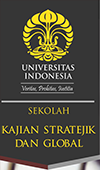Abstract
The war between Russia and Ukraine is highly discussed in global geopolitics and geostrategy. The strategy of attacking Russia directly at the point of a vital national object, namely the power plant, which was preceded by a cyber attack at the Nuclear Power Plant in Chornobyl, followed by a conventional physical attack from the air, resulted in an energy crisis in Ukraine. The resulting war affects many sectors, such as the energy sector, food, and supply chains, especially (at the end of 2021) before the war. WTI oil price was only around 75$/barrel, but when the war broke out, the price increased to 130$ (in August: 93$). It is estimated that oil prices will not fall significantly as long as the war is not over. The direct impact of war disrupts global energy security. This research uses a qualitative study based on the theory of incremental policy from several experts who support new policies quickly and national defense and energy security. Based on the incremental policy, policies that support the strengthening of cybersecurity will be produced, ranging from cryptographic policies to the potential for highly advanced energy sector blockchains.
References
[1] Berglund, S., & Karasimeonov, G. (2019). IN THE EU AND NATO BUT CLOSE TO RUSSIA--POST-CRIMEA ATTITUDES IN BULGARIA AND HUNGARY. Polish Political Science Review/Polski Przeglad Politologiczny, 7(2).
[2] Marples, D. R. (1993). “After the putsch”: Prospects for independent Ukraine. Nationalities Papers, 21(2), 35-46.
[3] Stegen, K. S. (2011). Deconstructing the “energy weapon”: Russia's threat to Europe as case study. Energy policy, 39(10), 6505-6513.
[4] Shevel, O. (2016). The battle for historical memory in postrevolutionary Ukraine. Current History, 115(783), 258-263.
[5] Dadush, U., & Weil, P. (2022). Will Ukraine’s refugees go home?. Policy Contributions, 16, 2022.
[6] Jagtap, S., Trollman, H., Trollman, F., Garcia-Garcia, G., Parra-López, C., Duong, L., ... & Afy-Shararah, M. (2022). The Russia-Ukraine conflict: Its implications for the global food supply chains. Foods, 11(14), 2098.
[7] Yakymenko, Y., & Pashkov, M. (2022). The Russian Shadow Over Ukraine’s European Choice. In Russia and the Future of Europe (pp. 169-172). Springer, Cham.
[8] Haney, B. S. (2020). Applied Artificial Intelligence in Modern Warfare and National Security Policy. Hastings Sci. & Tech. LJ, 11, 61.
[9] Cheng, M. (2022). The Ukraine Crisis: Causes, Conundrum, and Consequences. Journal of Social and Political Sciences, 5(2).
[10] Taghizadeh-Hesary, F., Yoshino, N., Abdoli, G., & Farzinvash, A. (2016). Macroeconomic Impacts of Oil Price Fluctuations in a Trade Linked Case. In Monetary Policy and the Oil Market (pp. 107-129). Springer, Tokyo.
[11] Kontorovich, A. (2015). Oil and gas of the Russian Arctic: History of development in the 20th century, resources and strategy for the 21st century. Science First Hand, 41(2), 42-61.
[12] Arranz, A. M., Thomson, R., Zech, S., Hegde, G., Arunachalam, D., & Rao, A. B. (2021). The uneven expansion of electricity supply in India: The logics of clientelism, incrementalism and maximin. Energy Research & Social Science, 78, 102126.
[13] Simon, H. A. (1957). Models of man; social and rational.
[14] Lindblom, C. E. (1989). The science of muddling through. Readings in managerial psychology, 4, 117-131.
[15] Braybrooke, D., & Lindblom, C. E. (1963). Strategy of decision; policy evaluation as a social process.
[16] Wildavsky, A. (1964). The Politics of the Budgetary Process, Little, Brown and Co.
[17] Bauer, M. W., & Knill, C. (2014). A conceptual framework for the comparative analysis of policy change: Measurement, explanation and strategies of policy dismantling. Journal of Comparative Policy Analysis: Research and Practice, 16(1), 28-44.
[18] John, P. (2003). Is there life after policy streams, advocacy coalitions, and punctuations: Using evolutionary theory to explain policy change?. Policy studies journal, 31(4), 481-498.
[19] Sekjen DPR RI. (2021). KERANGKA EKONOMI MAKRO DAN POKOK-POKOK KEBIJAKAN FISKAL TAHUN 2022. Badan Keahlian Sekjen DPR RI.
[20] Benton, T. G., Froggatt, A., Wellesley, L., Grafham, O., King, R., Morisetti, N., ... & Schröder, P. (2022). The Ukraine war and threats to food and energy security. Chatham House—International Affairs Think Tank.
[21] Geopoliticalfutures., (2022). The War. https://geopoliticalfutures.com/the-war/
[22] IMF., (2022). How War in Ukraine Is Reverberating Across World’s Regions. https://www.imf.org/en/Blogs/Articles/2022/03/15/blog-how-war-in-ukraine-is-reverberating-across-worlds-regions-031522
[23] Wang, R. (2013). Adopting local climate policies: what have California cities done and why?. Urban Affairs Review, 49(4), 593-613.
[24] IMF., (2022). Governments Need Agile Fiscal Policies as Food and Fuel Prices Spike. https://www.imf.org/en/Blogs/Articles/2022/04/20/blog-fm-govs-need-agile-fiscalpolicies-042022
[25] Šumskis, V., & Giedraitis, V. R. (2015). Economic implications of energy security in the short run. Ekonomika, 94(3), 119-138.
Recommended Citation
Rizaldi, Bobby Adhityo; Idris, Abdi Manab; and Nurbaiti, Nurbaiti
(2023)
"THE IMPACT OF RUSSIA-UKRAINE WAR ON ENERGY POLICY MANEUVERS TO STRENGTHEN ENERGY SECURITY AND CYBERSECURITY IN INDONESIA,"
Journal of Terrorism Studies: Vol. 5:
No.
1, Article 6.
DOI: 10.7454/jts.v5i1.1061
Available at:
https://scholarhub.ui.ac.id/jts/vol5/iss1/6
Included in
Defense and Security Studies Commons, International and Area Studies Commons, Political Science Commons, Terrorism Studies Commons


